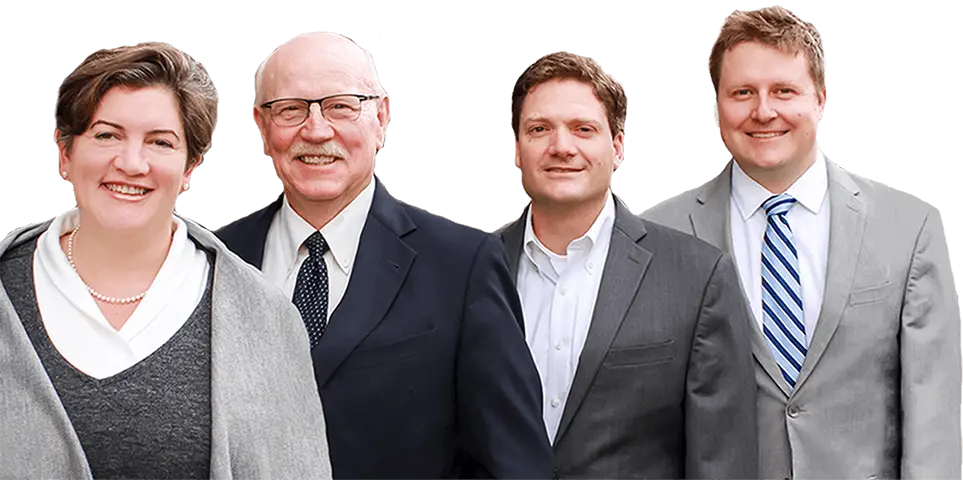Trusted Washington Traumatic Brain Injury Lawyers
 A head injury can result in permanent disability, seizures, memory loss, headaches, loss of taste or smell, double vision, speech impairments, anxiety, depression, personality changes, coma, and even death. The leading causes of head injuries include traffic accidents, slip–and–fall accidents, sports injuries, and construction accidents, among others. In other words, this type of injury is no laughing matter.
A head injury can result in permanent disability, seizures, memory loss, headaches, loss of taste or smell, double vision, speech impairments, anxiety, depression, personality changes, coma, and even death. The leading causes of head injuries include traffic accidents, slip–and–fall accidents, sports injuries, and construction accidents, among others. In other words, this type of injury is no laughing matter.
If you experience a brain injury, for example, you might not even notice obvious symptoms for some time after the accident. This means that you might not even find it easy to trace your symptoms to the accident that caused it. It might also be difficult to identify the culprit – was it caused by a traffic accident, by medical treatment after the accident, or by both? An experienced traumatic brain injury attorney should be able to help you identify possible culprits and evidence.
We recognize that this can be a stressful event to go through for you and your family. Our attorneys can help you file your claim and assist you in getting the compensation you need to recover.
Traumatic Brain Injury Cases Are Complex but Winnable
At Brett McCandlis Brown & Conner, our Washington traumatic brain injury lawyers have handled many such cases before; we have won six-figure – and even seven-figure – verdicts and settlements for our clients. We will take special steps to identify the extent of your injury, identify its real cause, and determine the extent of its effect on your life – both now and in the future.
It is critical in such cases that you accurately calculate your total long-term losses, such as medical expenses and lost wages, even decades into the future. This can be a complex process, but it is necessary – you need to demand as much compensation as you really need because you won’t be able to ask for more later. In no aspect is quality legal representation more critically important.
We settle the vast majority of our cases out of court. If the other side insists on being stubborn, however, our Washington traumatic brain injury lawyers are more than ready to win a courtroom battle, as we have done on many occasions. Insurance companies know this, and most of them don’t want to mess with us in court. This, in turn, renders them quite a bit more reasonable at the settlement table once they find out we are involved in your case.
We Get Results
- We obtained a $1.75 million settlement for a victim of a head injury that occurred in a rollover accident. More than two-thirds of this amount was for lost earnings, even though the victim was 56 years old at the time of the crash.
- We settled a case for $3.5 million against a railroad company on behalf of a railroad worker who was hit by a train, even though the victim was partly at fault for the accident.
These are only two of a multitude of favorable outcomes that our traumatic brain injury lawyers have achieved for our clients. Check out the rest of our website for further examples.
Negligence as a Major Cause of Head and Brain Injuries
Negligence is one of the main causes of injuries in accidents. This means that the person involved who caused your injury did not behave as an ordinary, reasonable person would.
There are four elements you have to prove to show that the other party was negligent:
- Duty,
- Breach,
- Causation, and
- Damages.
If one of these four elements cannot be shown, then you will not be able to prove that the other party was negligent.
Therefore it is important that you retain an experienced attorney who can help you. Otherwise, it is possible that you won’t be able to recover compensation for your injuries.
Types of Injuries
Several kinds of brain and head injuries can be possible in an accident. These can include:
- Skull fractures,
- Concussions,
- A hematoma (blood clot),
- A cerebral contusion or bruise,
- A hemorrhage, or
- Ischemia.
It is vital that you seek medical attention immediately after an accident if you have any injuries. You ought to make sure that you save copies of your medical records as well. Your records can serve an extremely useful function as possible evidence if you choose to bring a claim. Check out our FAQs below for potential symptoms of a brain injury.
Types of Cases We Handle
Car accidents
Car accidents trigger more personal injury lawsuits than any other cause of injury, with the possible exception of slip and fall accidents. A car accident can be caused by an incompetent or intoxicated driver, a malfunctioning auto part, or even a broken traffic light. If you have an injury due to a car accident, consider getting in touch with our brain injury lawyers. We can provide more information on how we can help you recover compensation.
Drunken Driving Accidents
A criminal conviction will punish an intoxicated driver who causes an accident, but it is unlikely to result in full compensation for you. Fortunately, it is just as possible to sue a drunk driver as it is to prosecute one – and it is easier to win.
Wrongful death
A wrongful death occurs when an injury victim dies as a result of someone else’s wrongful conduct. Damages are usually divided among close relatives, and they are usually comparable to the damages awarded in catastrophic personal injury cases. Car accidents, defective drugs, and medical malpractice can trigger a wrongful death lawsuit.
Bicycle accidents
A bicyclist is invisible to many motorists who are not anticipating the presence of a bicycle on the road. For this reason, a great many traffic accidents involving bicycles are the fault of a motorist, not the bicyclist. We know how to trace the true cause of an accident. The rule in Washington is that drivers need to keep about three feet of distance or more away from bicycles. This applies when the bicyclist is right on the side of the bicycle lane closest to a car as well.
Motorcycle accidents
Motorcyclists are just as vulnerable as bicyclists, but typically travel at much higher speeds. Even when the rider is wearing a helmet, death and serious personal injury are common. This is due to the extreme force of a car or truck as compared to the smaller force of the motorcycle. Serious injury can occur even when you make no actual physical contact with the motorist (when a motorist runs you off the road, for example).
While it is harder for drivers to see motorcyclists, this does not absolve them of responsibility. Drivers have a duty to drive carefully and pay attention to the road and their surroundings. Thus, they can be liable if you have an injury as a result of an accident.
Trucking accidents
An 18-wheeler truck is like a rolling missile that is difficult to control, especially on twisting two-lane highways. Truckers, however, are heavily regulated, and a regulatory violation can form the basis for a personal injury or wrongful death claim if it causes an accident.
These regulations in Washington include ensuring the commercial vehicle is not oversize or overweight.
Fatigue is another common reason that a trucking accident might occur. Commercial truck drivers must comply with federal regulations on taking rest breaks. If they cannot drive safely due to fatigue, they must stop driving.
There are also regulations for commercial vehicle drivers regarding mountain driving, driving in the winter, and driving in extreme heat. For example, in mountain driving, the driver has to know how steep the grade is and must apply the correct gears. If they do not follow these guidelines, they are subject to potential liability.
As you can see, 18-wheelers and other vehicles can, unfortunately, cause serious head or brain injuries. This could be because a driver did not follow one or more of these requirements. If a collision with a commercial vehicle caused you to have a head or brain injury, contact our Washington traumatic brain injury lawyers.
Defective drugs
Three types of drug defects can trigger a product liability lawsuit: A design defect, a manufacturing defect, and a failure to warn of significant dangers (that it should not be taken by people with heart problems, for example). Product liability lawsuits can be easier to win than other personal injury lawsuits. That is in part because, in Washington, product manufacturers can be strictly liable for complications with their products. Strict liability means that the product manufacturer will be responsible for your head or brain injury under certain circumstances, even if they exercised an abundance of care.
If you have any questions, contact our accomplished head injury attorneys.
Other types of accidents
Theoretically, any type of injury can trigger a personal injury lawsuit as long as it was caused by someone else’s misconduct. You might be able to sue a bar, for example, if their bouncer unjustly attacked you, or sue a grocery store for failure to clean a slippery floor.
Frequently Asked Questions (FAQs)
What Are the Common Symptoms of a Brain Injury?
Some of the most common symptoms of brain injury include:
- Nausea,
- Vomiting,
- Headaches,
- Depression and mood changes,
- Difficulty concentrating,
- Blurred vision,
- Sensitivity to light and sound,
- Dizziness,
- Blackouts,
- Sleeping difficulties, and
- Fatigue.
If you are experiencing any of the above symptoms, it is essential to call your doctor or emergency services if necessary.
What Is “Maximum Medical Improvement” (MMI)?
You reach Maximum Medical Improvement when your doctor confirms that you have improved about as much as you are ever going to. Under Washington law, this means that your injury is “fixed and stable.” This doesn’t mean that you don’t still suffer from long-term disability. It means that even if there is further treatment, the condition is not expected to improve much. Your condition could fluctuate, however, and become slightly better or worse over time. Yet a doctor will still consider it to be an MMI because it is overall not going to improve dramatically.
We understand that you may be anxious to reach a settlement quickly. But keep in mind that you may need to reach MMI in order to properly calculate the amount of your damages claim.
What Kind of Damages Might I Be Eligible For?
Following is a list of the most common categories of damages in serious injury cases:
- Past, present, and future medical expenses;
- Past, present, and future lost earnings;
- Incidental expenses, such as travel and childcare;
- Pain and suffering; and
- Mental anguish (the intangible suffering you may experience due to, for example, being unable to walk or bathe yourself without assistance).
An attorney can help you calculate the value of your damages.
Must a Claim Be Abandoned If the Victim Dies?
No. The death of the victim simply converts an injury claim into a wrongful death claim. A wrongful death claim can be filed by the personal representative of the victim’s estate or by certain eligible close relatives. The recovery is likely to be substantial, and most or all of it usually goes to close relatives.
What Is the Statute of Limitations for a Brain Injury Lawsuit?
In Washington, you have three years from the date of the accident to file a traumatic brain injury lawsuit, or three years from the date that you knew or should have known of the injury – whichever date is later. In a wrongful death lawsuit, you have three years from the date of the victim’s death.
Complying with the statute of limitations is critical because you might not be able to bring suit if you file late. While an exception may apply to extend the statute of limitations, such exceptions are rare and apply only in very limited circumstances. It’s always best to file suit as soon as possible so that you can ensure you meet the deadline and have the best evidence available to you. Our personal injury attorneys can help you meet this time limit.
Can the IRS Tax My Verdict or Settlement?
The general answer is no, not even compensation for lost earnings. As long as you suffered a tangible physical injury, the IRS also cannot tax you for non-economic damages, such as pain and suffering (isn’t it nice to know that the IRS cannot tax your suffering?). There are exceptions in certain situations, however, so check with your injury lawyer.
Is My Claim Worthless If My Injury Was Caused by an Accident That Was Partly My Fault?
Not necessarily. Under Washington state’s comparative fault rules, when an accident is partly your fault, your compensation is reduced in proportion to your degree of fault. If the accident was 35 percent your fault, for example, you would lose 35 percent of your damages (but you might have to pay 35 percent of the other party’s damages). Our skilled Washington traumatic brain injury attorneys should be able to help you assess the percentage of fault and the best way to proceed with a brain injury lawsuit.
Should I Make a Recorded Statement to the Insurance Company?
Not without consulting with your traumatic brain injury attorney first. The insurance company – whether it is your own or another party’s – makes money by denying or minimizing your claim, and they are very good at manipulating accident victims into making statements that can be used against them later. We know all their tricks.
The Decision Is Yours to Make
A catastrophic injury is no occasion to settle for amateur or even mediocre legal representation. We have recovered over $100 million in verdicts and settlements over the years, and we win 97 percent of our cases. We are so confident in our ability to do the same for you that if we take your case, you will not owe us a penny until and unless we win your case. That’s right – if we don’t win, you don’t pay.
At Brett McCandlis Brown & Conner, fighting for people like you is why we exist – it’s what we do all day, every day. Personal injury is not a “division” of our firm – it is what we do, and it is all we do. Let our traumatic brain injury attorneys handle the compensation issues while you concentrate on putting your life back together.
Talk to Our Washington Traumatic Brain Injury Lawyers Today
If you have suffered a head or brain injury that you believe was someone else’s fault, or even if you suspect that you have suffered this type of injury, contact our Washington traumatic brain injury attorneys today at 1-800-925-1875, or fill out our online contact form so that we can contact you to schedule a free consultation and evaluate your options. Our compassionate, knowledgeable head injury lawyers have over 40 years of experience in personal injury. We have several locations in WA, including a law office in Seattle. Allow us to help you recover the compensation you need so that you can move forward.


